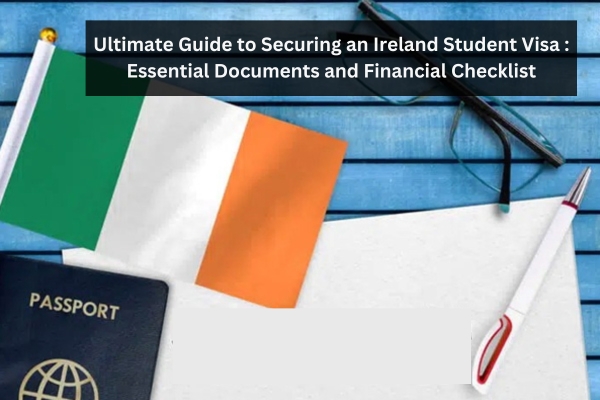For many international students, studying in Ireland is their ideal scenario. Ireland provides an exceptional chance for both intellectual and personal development because of its globally recognized educational institutions and dynamic culture. However, obtaining a student visa is an essential step in the process before you pack your bags and travel to the Emerald Isle. This thorough guide will help you ensure that you have all the necessary paperwork and funds needed for an Ireland student visa.
Mandatory Documents for an Ireland Student Visa
- Cover Letter: Your visa application should include a cover letter explaining your travel intent. This letter should outline your reasons for studying in Ireland, your choice of course, and your future plans.
- Passport: Ensure your original passport is valid for at least 6 months beyond your intended departure date from Ireland. All previous passports should also be submitted with your application.
- AVATS Online Application: Complete the AVATS (Visa/Preclearance Application Facility) Online Application form. Make sure to fill out all sections thoroughly and print the overview page for submission.
- VFS Appointment Validation: For your VFS appointment, you’ll need to present an online fee payment receipt. This is proof that you’ve paid the necessary visa application fee.
- Application Forms: Fill in the details in the respective visa forms.
- Completed Student Visa Application: Ensure every section is filled out accurately.
- Supplementary Student Application Form: This form provides additional details that support your visa application.
- Photograph: Provide 6-8 recent (within the last six months) passport-sized colour photos (35x45mm) with a white background and dark clothes.
- Acceptance Letter: Submit an acceptance letter from an Irish school, college, or university confirming your admission.
- English Language Test Scores: Include proof of your English proficiency through test scores from IELTS, TOEFL, Duolingo or PTE.
- Statement of Purpose (SOP): Write a detailed SOP explaining why you chose your course and institution, your academic and career goals, and how studying in Ireland fits into your future plans.
- Intent to Return: Confirm your intention to return to your country of permanent residence after completing your studies.
- Resume/Curriculum Vitae (CV): Your CV should detail your educational background, work experience, and any relevant skills or achievements.
- Educational Documents
- Include copies of: 10th and 12th Standard Mark Sheets
- Diploma/Bachelor’s/Master’s Degree Documents: This should encompass individual semester mark sheets, a consolidated mark sheet, a provisional certificate, and a degree certificate.
- Discrepancies Explanation: If there are any discrepancies in your educational records, provide a clear explanation.
- Job Experience: Document any relevant job experience that supports your application.
- Evidence of Course Fees PaymentShow proof that you have paid the full course fees or at least the minimum required (as asked by your respective institute).
- Financial Proof: Provide evidence of sufficient funds (€10,000) to cover your initial stay in Ireland.
- Private Medical Insurance/ Health Insurance: To guarantee that you will be medically covered during your visit, you must provide proof of your medical insurance. This is often a requirement to cover potential health issues during your time in Ireland.
- Police Clearance Certificate: Submit a certificate demonstrating your clean criminal record.
- Miscellaneous Letters: Include any additional letters required based on your profile.
Checklist of Financial Resources
- Education Loan Documents
- Sanction Letter: Proof of your education loan approval.
- Letter of Disbursement: Documentation showing that funds have been disbursed for your education.
- Bank Statements
- Recent Statements: Provide the most recent bank statements for all your accounts, in some cases source of funds is also required.
- Balance Confirmation Certificate: Get a certificate in euros for each bank account and any fixed or recurring deposits, including the deposit and maturity dates.
- Provident Fund Statements
- Employees’ Provident Fund (EPF) / Public Provident Fund (PPF) / Central Provident Fund: Provide the latest statements for these accounts.
- Income Tax Returns: Submit the income tax returns (ITR) or Form 16 from all your sponsors for the last three years.
- Salary Slips: If your sponsor is employed, include the last three months’ salary slips.
- Affidavit of Support: Provide an affidavit of support from all sponsors, accompanied by a government-issued identity card.
Conclusion
Securing an Ireland student visa requires careful preparation and attention to detail. By gathering all the necessary documents and financial resources listed above, you’ll be well on your way to obtaining your visa and embarking on your academic journey in Ireland. Ensure that every document is accurate and up-to-date to avoid any delays or complications in your application process.
If you need personalized assistance throughout the application process, Focus Education is here to help. Our team of experienced visa consultants guides students through the complexities of visa applications and ensures that every aspect of your submission is handled with precision. From gathering the right documentation to providing expert advice on meeting visa requirements, Focus Education is dedicated to making your transition to studying in Ireland as smooth and stress-free as possible. Contact us today to start your journey with confidence and ease. Good luck with your visa application and enjoy your studies in Ireland!



